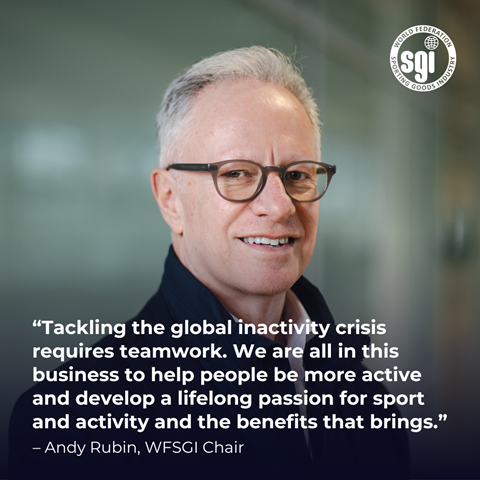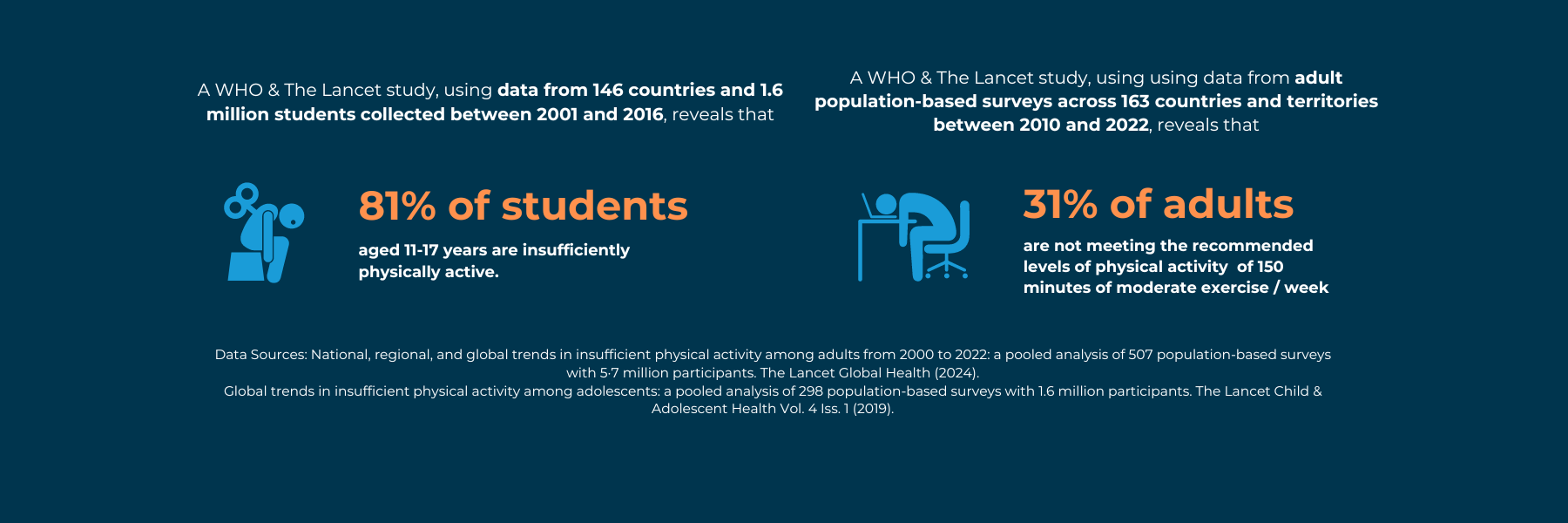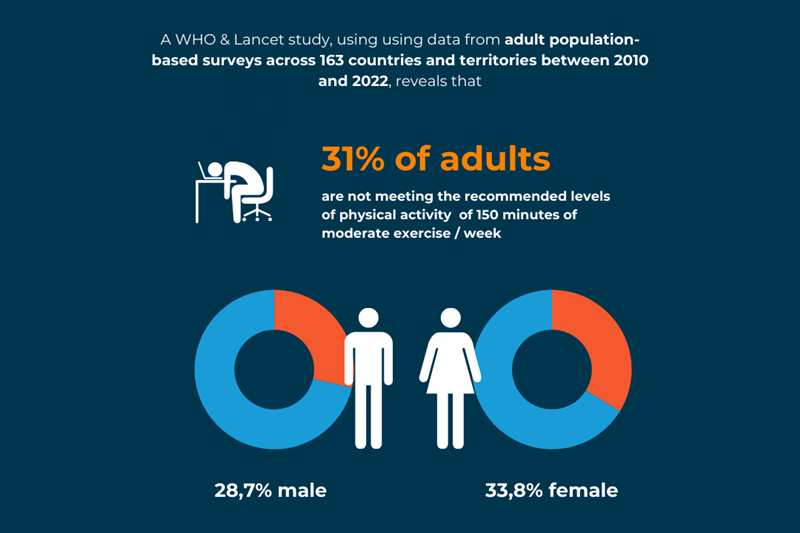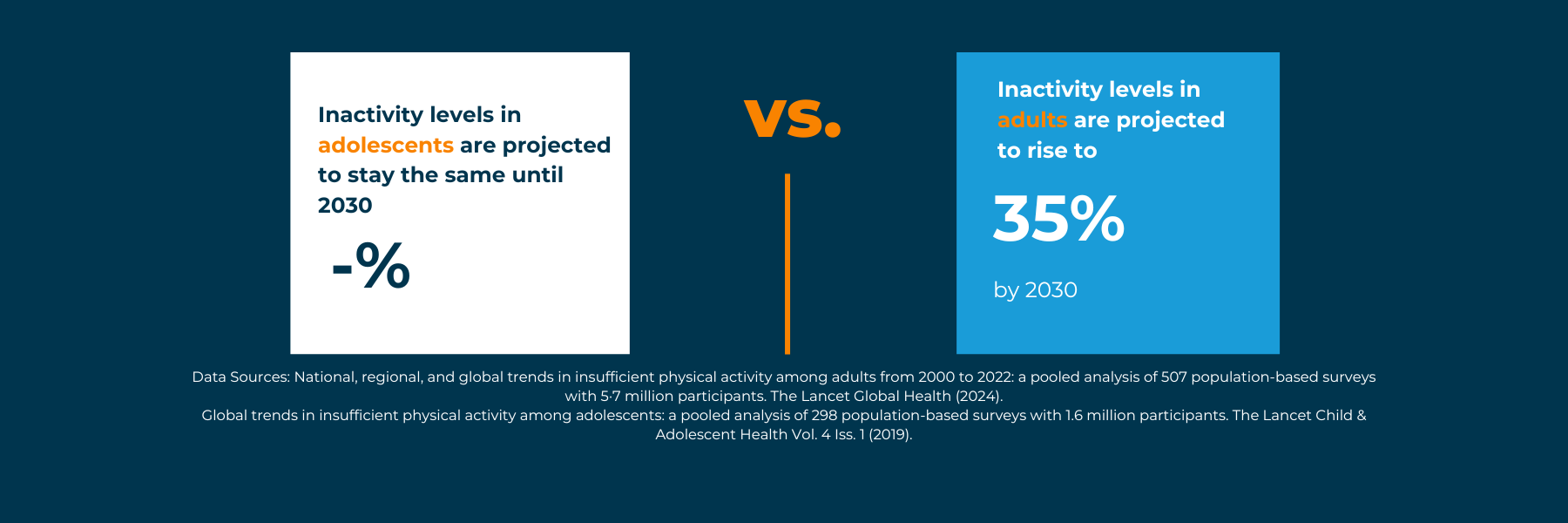Addressing the global physical inactivity crisis 2024
“The world is off track to meet the WHO target of a 15% relative reduction in the global prevalence of physical inactivity by 2030.” - WFSGI
The Impact of Sports 2024 - It's our time to act
The latest data from the World Health Organization reveals that 31% of adults are physically inactive and are not meeting the recommended levels of physical activity (150 minutes of moderate exercise per week). If this trend continues, global levels of physical inactivity are projected to rise to 35% by 2030 (up from 26% in 2010).
In a joint statement, the World Federation of the Sporting Goods Industry (WFSGI), together with leading sporting goods companies worldwide, commits to urgent action to address this physical inactivity crisis. As a business publication, we normally stand on the sidelines, listening and sorting the most important facts for our readers. In this case, we are not only the audience but also fully support the joint effort of our industry.
Global Inactivity Crisis: Industry response and key data insights
The WFSGI report underscores the dire consequences of physical inactivity on public health and the sporting goods industry. With non-communicable diseases on the rise, reversing this trend requires large-scale societal change and collaboration across sectors, including government, the private sector, and international organizations.

WFSGI and sporting goods brands call for urgent and coordinated action to address the global physical activity crisis.
The WFSGI and major sporting goods companies are pledging to raise awareness, support active lifestyles, and leverage major sporting events to combat physical inactivity.
Industry strategies to tackle the crisis
The WFSGI, alongside prominent sporting goods companies, is spearheading initiatives designed to increase physical activity levels worldwide. Recognizing that no single entity can address this issue alone, the industry is calling for coordinated efforts that span across sectors. This includes partnerships with governments, health organizations, and community groups to create environments that encourage active lifestyles.
WFSGI CEO Emma Zwiebler: “We need to tackle the physical activity crisis by harnessing the power of our industry”
Physical inactivity is on the rise, posing a major threat to public health and the sporting goods industry.
How to turn sports passion into movement
The sports world must confront reality: there is very limited data that suggests major sporting events significantly boost long-term sports participation.
Global decline of physical movement and how the sporting goods industry can take up this challenge
The global decline in physical activity poses serious health risks, and the sporting goods industry is uniquely positioned to address this challenge through innovative initiatives.
Driven by purpose: Voices of the sports industry
Sport is more than just physical activity; it is a powerful force for positive social change. From promoting inclusion and teamwork to enhancing mental wellbeing, leading brands like Nike, Puma, and Pentland Brands are using their platforms to foster community, support equality, and champion crucial social causes.
Harnessing major sports events for social and economic growth
We provide you a data-driven perspective on how major sporting events can transform cities and communities.
Driven by purpose: the social impact of sport
Sport is a powerful force for positive social change, promoting inclusion, teamwork, and mental wellbeing. From grassroots initiatives to global campaigns, leading brands like Nike, Puma, and Adidas are using their platforms to foster community, support equality, and champion important social causes.
Under Armour’s Kevin Ross: “It’s about more than just the game”
Kevin Ross, SVP and EMEA Managing Director at Under Armour, discusses how the brand leverages sports for social impact, focusing on youth empowerment and community well-being. Discover how Under Armour’s initiatives and partnerships aim to prepare young athletes for success in life beyond sports.
Addressing physical inactivity: Nike’s strategic approach to inspiring youth
In an exclusive interview, Nike’s Rosalyn Menon Kennedy reveals the company’s initiatives to promote an active lifestyle among youth.
Asics’ Gary Raucher: “Our role in society is inspire people to move”
SGI Europe spoke to Gary Raucher, Executive Vice President, Head of Product, Marketing, and Merchandising at Asics, about the brand’s influential role in promoting physical and mental health through sport.
Pentland’s Simon Rowe: “We have a responsibility to drive change”
Pentland Brands is on a mission to get people moving. Discover how their sports brands like Speedo and Canterbury want to help 100 million people to be more active.



Latest News
Adidas climate neutrality ad banned by German court
Adidas is ordered to stop promoting its “carbon neutral by 2050” pledge, a court having ruled that its net-zero advertising is misleading.
Under Armour displays its first regenerative collection
Under Armour and Portland-based Unless will show a collection designed to return to soil at Milan Design Week.
Polartec expands its Power Shield™ collection and further reduces carbon footprint
Polartec pushes boundaries with plant-based, PFAS-free and recyclable textiles, proving high performance and sustainability go hand in hand.



















